Calculate Website Value: How Much Is My Website Worth?
A website is an asset — and like most assets, it can be bought and sold. If you've built a website and no longer want to invest time and energy in running it, you can sell it to the highest bidder. But what should be your asking price, and how much money can you realistically expect?
In this guide, we'll show you how you can assess the monetary value of your website. We'll also explore popular methods for selling a website and provide tips on how you can increase its value.
How Much Is My Website Really Worth?
Before we dive in, it's important to understand that there's no method to precisely determine a website's value down to the last penny. None of the tools or strategies we discuss will provide an exact price for your website.
However, there are several factors, methods, and tools that can help you estimate your website's worth. Let's start with the data.
Key Factors and Data That Impact a Website's Value
A website's sale price is determined by various factors that you, as its owner, should be familiar with. At the end of the day, these reflect the overall quality and potential of your website.
Financial data
Potential buyers often first examine the financial health of a website or web asset. This data highlights the profitability and stability of an online business. Key questions often include:How much monthly income does your website generate?
What are your sources of revenue (ads, affiliate marketing, product/service sales)?
How high are your monthly costs (hosting, ads, content creation, technical maintenance)?
What are your profit margins?
Traffic data
Traffic metrics are crucial for gauging public interest in your website. Tools like Google Analytics can help you accurately track this data.How many visitors does your website have?
How many of them are unique visitors?
How many impressions/page views does your website have per day/week/month?
What are your traffic sources (organic, paid, social, direct)?
Where are your visitors from (geographically)?
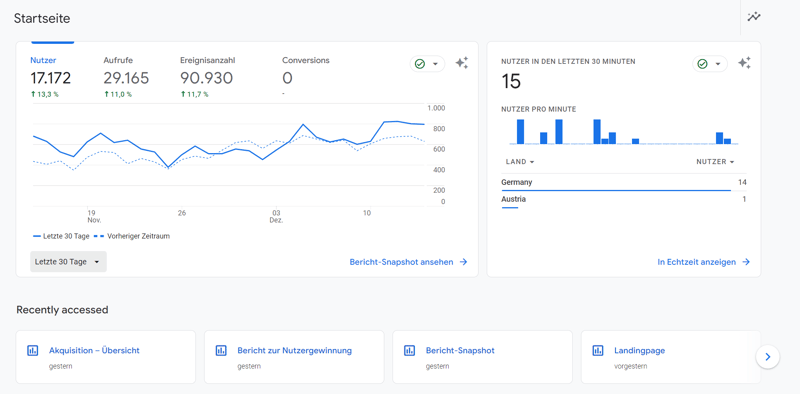
Tools like Google Analytics automatically provide important statistics and metrics for your website.
Engagement data
It's also important how visitors interact with your content. Websites with greater user engagement will be more attractive to potential buyers.What is your website's bounce rate?
How long do visitors stay on your website?
How many pages does a visitor check per session?
How many user interactions (comments, shares, likes) are there?
Content and SEO data
Sustainable success online is only possible if you offer high-quality content that's well-rated and ranked highly by search engines. These factors will also impact your website's value.How much quality content does your website have?
How does your website/content rank for significant keywords?
How many backlinks does your website have and what sort of quality are they?
Technical data
A website with a robust technical infrastructure requires less investment from potential buyers, making it more appealing.What's your website's loading speed and how is its overall technical performance?
Is your website optimized for different end devices, such as smartphones and tablets?
Does your website meet all important security and data protection/privacy standards?
There are many other factors that contribute to a website's value, and not all of them are as tangible or measurable as the ones listed above. For instance, a website's reputation and the strength of its brand in its market can significantly affect its worth. Similarly, the quality of your domain name can boost brand recognition and SEO performance.
Growth and scalability matter, too. A website with potential for future expansion, particularly in niche markets, may be deemed more valuable. Conversely, a site that has peaked might find its selling price affected negatively.
Of course, you can also sell a domain on its own, separate from its website. The worth of a domain hinges on how attractive, memorable, and relevant it is. In contrast, a website's value is shaped by its content, traffic, income, among other elements. Both domains and websites can be bought together or individually.
Guidelines for Determining a Website's Value
The metrics we've discussed are crucial for gauging your website's success and serve as a solid foundation for estimating its value. But how do you translate these into a sale price?
Luckily, there are a few guidelines and methods that can help you out:
Method 1: Price-Earnings Ratio
The Price-Earnings (P/E) ratio uses your website's monthly gross income to estimate its sale value. Multiply the monthly income by a chosen multiple. For example, if your site makes $1,000 a month and you apply a multiple of 20, the potential sale price is $20,000.
Determining the right multiple involves more than guesswork; it's based on hard data and specific factors. Empire Flippers, a website marketplace, calculates multiples according to the following factors:
Overall quality of the website: A site that's visually appealing, modern, mobile-friendly, and filled with quality content is more valuable. Of course, this factor is somewhat subjective.
Growth trends: Which niche does your website serve? How future-proof is it?
Stability and diversification of revenue: Does your website have a single stream of revenue, or are there multiple sources of income?
Stability and diversification of traffic: Where does your traffic come from? Do visitors find your site primarily through a single source, like Google, or multiple ones?
Owner engagement: How involved are you in the day-to-day of your website? A site requiring minimal hands-on management might be more attractive to buyers.
Website age: The longer a (successful) website has been around, the more valuable it is. This is because older websites have significant amounts of user and traffic data and are considered more trustworthy by Google.
Mailing lists and social media: A strong subscriber base or social media following represents significant potential value.
Backlinks: A website with plenty of backlinks on high-quality and reputable pages is more valuable than one that has lower-quality backlinks or none at all.
Affiliate agreements: The number and quality of affiliate partnerships can increase a website's monetization potential.
The multiple you choose should reflect these aspects and be justifiable with data. Multiples typically range from 12 to 50, indicating a broad spectrum of possible values.
For comparative data or to find appropriate multiples, you can check the multiples for similar websites that are listed on marketplaces like Empire Flippers, Motion Invest, or Flippa.
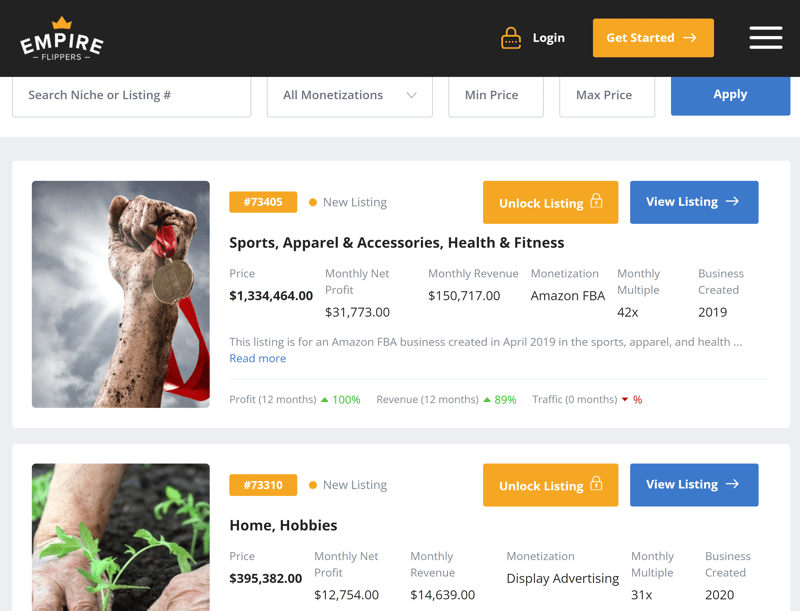
On website marketplaces like Empire Flippers, you can check suggested sales prices and multiples for listed websites.
Method 2: Traffic Value
Your website generates little to no direct revenue? In that case, you can determine its value using your traffic statistics. Start by identifying the cost-per-click (CPC) for your most significant keywords using tools like Google's Keyword Planner. Then, you can multiply each by the number of visitors who find your website using these keywords.
Let's say that a keyword has a CPC of $0.50 and draws 1,000 visitors to your site per month. In this case, you'd have a monthly traffic value of $500 ($0.50 × 1,000). Now, multiply this figure by an appropriate factor.
To estimate the total value of your website's traffic — essentially, what it would cost someone per month to acquire the same amount of traffic through Google Ads — ahrefs Traffic Checker is a useful resource. This tool provides insights into your website's traffic value and also compares it with your competitors.
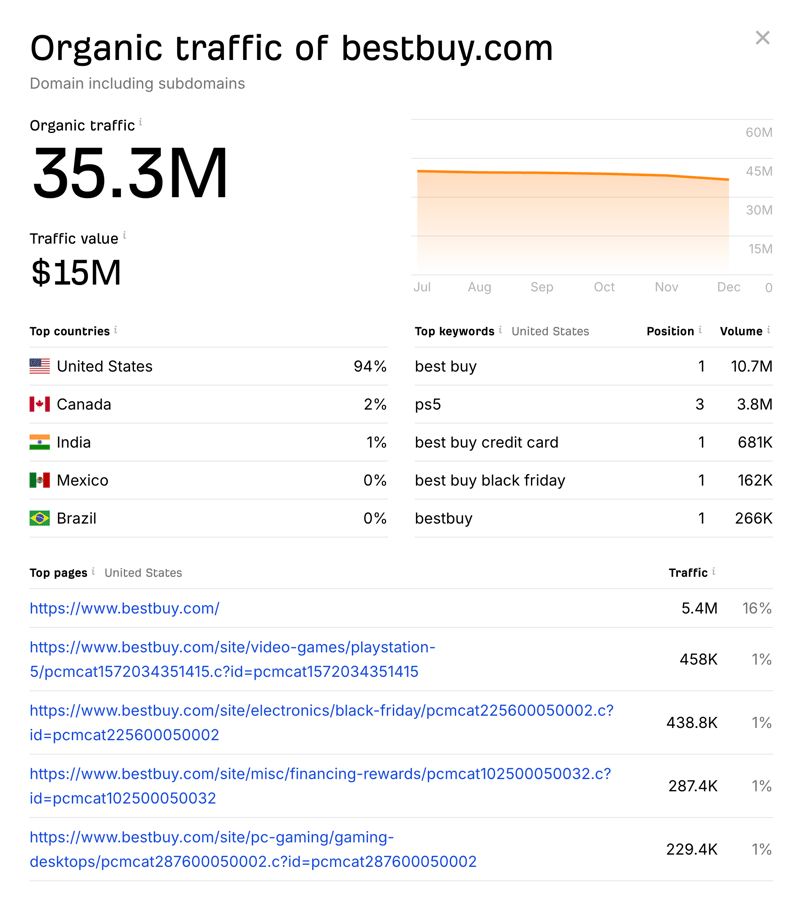
The ahrefs' Traffic Checker is a useful tool for finding out a website's traffic value.
Remember, the guidelines provided are just that—guidelines. They may apply in some situations but not in all. At best, they offer a starting point that you can use to approximate the value of your website.
Online Calculators
If you'd prefer to leave the calculations up to others, you can use one of the many online valuation tools to get a rough idea of how much your website is worth. Here are a few examples:
Empire Flippers
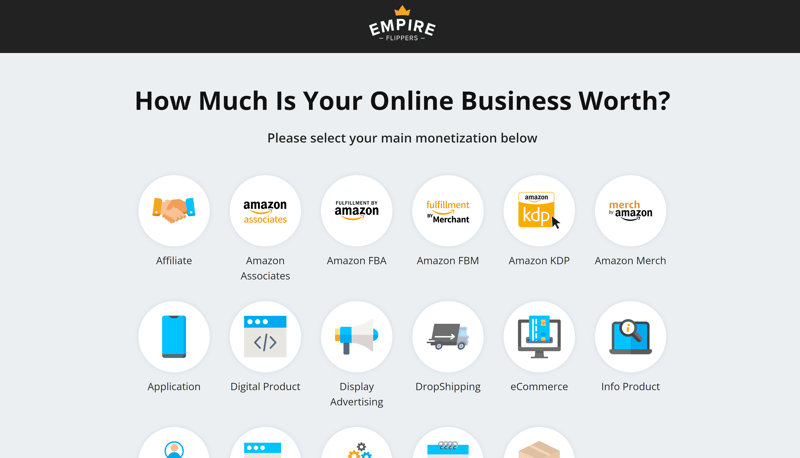
Empire Flippers's website value calculator.
Empire Flippers is a website marketplace that offers its own valuation tool. You can use it to assess the worth of various website types across different monetization categories. Simply provide details about your project, including its duration and income, to get an estimate.
worth of web
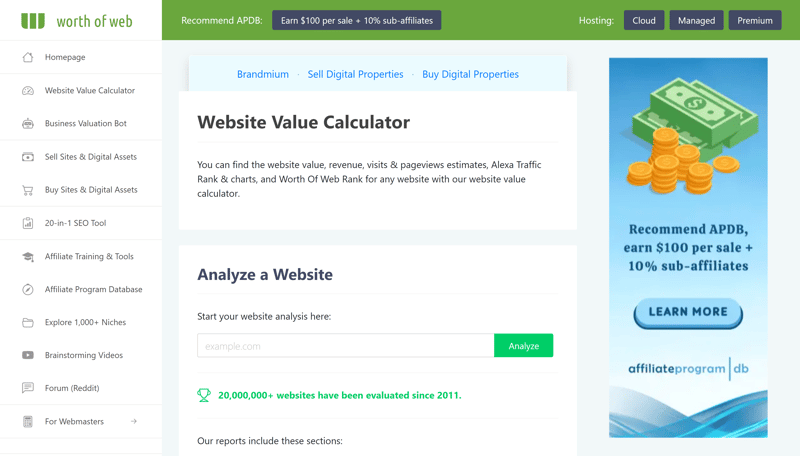
worth of web estimates the value of ad and affiliate-financed websites.
Another tool is offered by worth of web, which uses publicly available traffic data to estimate how much ad revenue a website can generate. It bases its estimate upon the assumption that the website derives its revenue from ads and affiliate programs.
Other Tools
Of course, there are plenty of other calculators available for use, including:
Try out a few different tools and see how consistent the estimated values are.
Remember that these online tools, while useful, aren't infallible either. They don’t guarantee exact or consistently reliable valuations. Instead, they provide a perspective, allowing you to cross-reference their estimates with your own to determine if your valuation seems reasonable.
5 Ways to Increase the Sale Value of Your Website
If you want to secure the best possible price for your website, you should try to maximize its value before the sale. Here are effective ways to do just that:
Improve Your Content
"It’s the content, stupid!"
Many website owners are quick to blame Google for their low traffic numbers — when the simple truth is that their content just isn't up to scratch. That's why you should start by taking an honest look at your website:
Is its design visually appealing, modern, and optimized for all types of end devices?
How does your content perform compared to that of your competitors?
Do you offer high-quality articles or a lifeless mass of SEO content?
Do you have a content strategy and target the right keywords?
Do your articles answer the questions that your target audience has?
Regardless of your plans for the website, quality content is essential for lasting success.
Diversify Your Traffic and Revenue
Investors tend not to put all their eggs in one basket. That's why websites relying on a single traffic or revenue source are less appealing.
If you're looking to diversify your traffic and income stream, start by asking yourself the following questions:
Are there sensible ways to change or adjust the existing business model?
Can you activate ads on your website?
Are there products, either digital or physical, that you could sell?
Are there any potential affiliates that you haven't spoken to in a while or lost contact with?
Do you use social media? Can you promote your website, articles, or products with it?
The more sources of traffic and revenue you have, the better. However, prioritize the channels and strategies that hold the greatest potential for your specific website. A social media community doesn't make sense for every niche, nor can every website justify a membership model.
Optimize Your Website's Technical Aspects
A broken-down car won't fetch top dollar — the same is true for a website that requires an overhaul right off the bat. That's why you should ensure that your website’s technical aspects, including its performance, security, and stability, are up-to-date.
To start, take a close look at where your website stands:
What are your website's loading times (page speed)?
How often is your website down?
How mobile-friendly is your website?
Does your website meet all common security standards?
Our website tools can help you identify potential problems with your tech stack early on:
In case your website's performance doesn't match its potential, be sure to check out these guides:
Remember: The less work your website's new owners will have to put in after the purchase, the more they'll be willing to pay.
Organize and Structure Your Workflows
Buyers are looking for a website that will generate revenue, not a full-time job. Hence, it’s crucial to have your workflows and processes streamlined, formalized, and thoroughly documented.
If multiple people work on your website, adopting project management frameworks is highly advisable. This ensures tasks and responsibilities are clearly defined and organized. Aim to automate processes wherever feasible, enhancing efficiency and minimizing errors.
Negotiate With Affiliates
Renegotiating with your affiliate partners can significantly boost your revenue. That's why you should periodically revisit terms with existing affiliates or seek new partners open to better agreements.
If you've built strong relationships with your affiliates and consistently drive valuable traffic and leads to them, there's nothing wrong with seeking better terms for your website.
Sell Your Website
Once your website is ready for sale, you have two main paths: you can either start looking for a buyer yourself or list it on a marketplace/brokerage platform. The latter will help you with everything from marketing to selling, to transferring your website.
For a more detailed walkthrough, check out our comprehensive guide, available here:
Conclusion: It's Hard to Precisely Estimate the Value of a Website
If you're considering a sale, it's crucial to understand the market value of your website. Pinpointing an exact figure is quite difficult — but key metrics can guide you towards a well-informed estimate.
There are plenty of tools and methods that help you with these estimations, from online valuation tools to profit multiples based on specific metrics. It's also helpful to compare yours with similar websites currently on the market.
Keep in mind that all of these methods and tools only offer a starting point. The true value of your website will ultimately be decided by the market, meaning: your website is worth as much as someone is willing to pay for it. You can learn more about how to actually go about selling your website here.






















